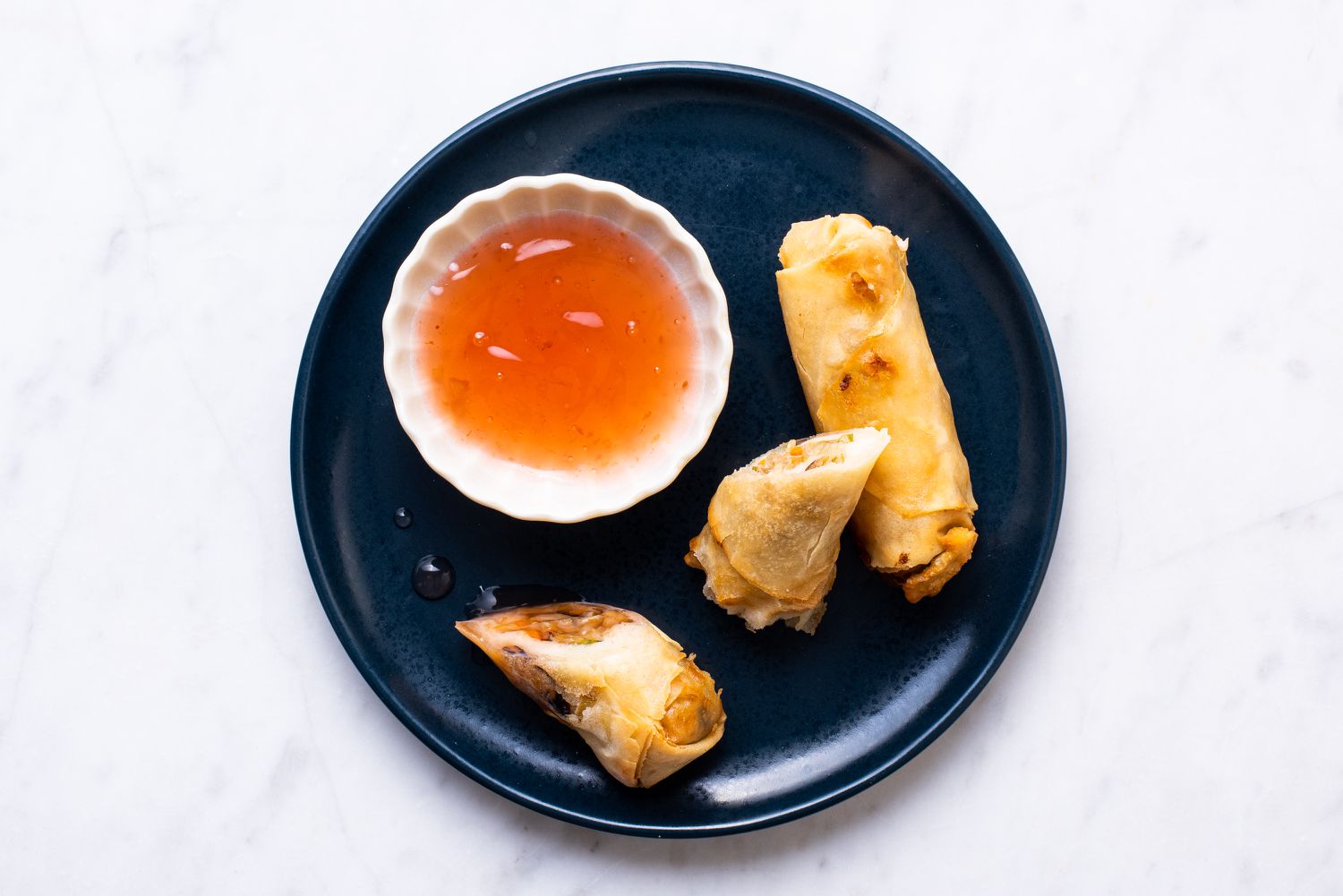Duck Sauce Nutrition Facts and Health Benefits

Verywell / Alexandra Shytsman
As one of the most popular condiments in Asian restaurants, duck sauce offers a favorable sweet and sour flavor, a bright orange color, and a jelly-like consistency. Most duck sauce consumers choose to dip Asian sides, such as egg rolls, spring rolls, and wontons, into the condiment, and they lightly pour the sauce on top of protein-based dishes to sweeten the overall flavor.
Duck sauce is made of mostly sugar, so you should consume the condiment in moderation. You will find little protein, vitamins, and minerals, and a high amount of sodium and carbohydrates, in the sauce. Here is what you need to know about duck sauce.
Duck Sauce Nutrition Facts
This nutrition information, for 1 tablespoon (16 grams) of duck sauce, is provided by the USDA.
- Calories: 39.2
- Fat: 0.021g
- Sodium: 114mg
- Carbohydrates: 9.71g
- Fiber: 0.096g
- Sugars: 4.88g
- Protein: 0.058g
Carbs
One tablespoon of duck sauce contains a little under 10 grams of carbs, depending on the brand. The carbs are found in the apricot jam, soy sauce, and pickled fruits, such as plums and pineapples.
Duck sauce is high on the glycemic index as the condiment is almost all sugar, so you should use the sauce in moderation. One strategy you can use is to measure the amount you want and serve the sauce on the side.
Fats
The fat count in duck sauce is low, with less than 0.03 grams per serving. The total fatty acids, including monounsaturated and polyunsaturated fat count, are negligible, measuring 0.007 grams. As sugar contains no fat, duck sauce is nearly fat-free.
Protein
Duck sauce contains almost no protein. Most people choose to consume duck sauce alongside protein like roasted meats.
Vitamins and Minerals
Vitamins and minerals in duck sauce include 0.8 milligrams of magnesium, 0.032 milligrams of vitamin E, and 1.76 milligrams of calcium. Duck sauce also contains 0.272 milligrams of choline.
Calories
A serving of duck sauce contains about 40 calories. A small packet that you often receive with your takeout contains 22 calories. A larger 100-gram quantity has 245 calories. The majority of the calories come from the sugar.
Health Benefits
Duck sauce is known for its sweet and fruity flavor that comes from a mix of fruits that can include everything from apples and plums to apricots. Duck sauce does contain very small amounts of magnesium and calcium as well as some vitamin A and vitamin E. That said, duck sauce is a high sugar condiment, so people with diabetes and those watching their sugar intake may want to limit their use of duck sauce.
Although duck sauce offers minimal health benefits it does enhance the flavor and palatability of the dishes it is added to like spring rolls, roasted meats, and wontons. There is even some evidence that a food that tastes good to the consumer, is more satiating and may aid in weight management. So, if you particularly enjoy duck sauce, you may find that adding a small amount to your favorite dish helps you to feel satiated.
Allergies
Duck sauce does not contain any of the major food allergens. The sauce does contain a few fruits, and although allergies to fruits are rare, they can occur. You should speak with a healthcare provider if you experience any symptoms after consuming duck sauce, as you might have an allergy from the Rosaceae family (a medium-sized family of flowering plants).
Common allergy symptoms include swelling, itchiness, hives, and even breathing difficulties. Keep in mind that if you are consuming a variety of ingredients at once, your allergic reaction could be related to anything in your meal, so it is important to get allergy testing to determine exactly what is causing your reaction.
Storage and Food Safety
Duck sauce is the best right after opening a jar, but it will last for a long period of time if refrigerated after opening. Once opened, a jar of duck sauce will keep for 1 year in the refrigerator.
If you like to hang on to packets of takeout sauce, you can keep duck sauce for up to 1 year in a kitchen drawer. The sauce lasts because it does not contain easily spoiled ingredients, such as dairy. The orange color could change over time, but the sauce is safe to eat.
How to Prepare
The best way to use duck sauce is to serve the sauce alongside Asian meals as a dipping sauce. This way you can control how much of the sugary sauce you are consuming. Overall, the flavor of duck sauce complements a number of dishes. These include stir-fries, egg rolls, spring rolls, cream cheese wontons, and protein-based Asian meals.
USDA. Duck sauce.
Hetherington MM, Cunningham K, Dye L, Gibson EL, Gregersen NT, Halford JC, Lawton CL, Lluch A, Mela DJ, Van Trijp HC. Potential benefits of satiety to the consumer: scientific considerations. Nutr Res Rev. 2013 Jun;26(1):22-38. doi:10.1017/S0954422413000012 PMID:23680169
University of Nebraska-Lincoln. Allergenic foods and their allergens, with links to Informall.
American College of Allergy, Asthma, & Immunology. Food allergy.
:max_bytes(150000):strip_icc()/Jennifer-Purdie-660-860ee4e986fc4052821de676195461b3.jpg)
:max_bytes(150000):strip_icc()/HeadshotMiaSyn-8f69603e0dac49aea62067a9b2d42a36.jpg)
:max_bytes(150000):strip_icc()/Jennifer-Purdie-660-860ee4e986fc4052821de676195461b3.jpg)
:max_bytes(150000):strip_icc()/cocktail-sauce-crop2-282b4141e3cb4b82a641b765cf2cdc11.jpg)
:max_bytes(150000):strip_icc()/woscestershire-crop-2-d941b23ba8cb45f69f84febaf7f02cdf.jpg)
:max_bytes(150000):strip_icc()/soy-sauce_crop-f0f754fb51d841a6ada46fa1695a646a.jpg)
:max_bytes(150000):strip_icc()/GettyImages-472927590-5798904d3df78ceb863687b1.jpg)
:max_bytes(150000):strip_icc()/tartar-sauce-54bacd0fa5d84407a3370b2f9f7dd58e.jpg)
:max_bytes(150000):strip_icc()/GettyImages-177746753-b3dc71996812470eba1a323f89cde3ef.jpg)
:max_bytes(150000):strip_icc()/pluots_annotated-2feafe8227f9469dae480b7fd17a792c.jpg)
:max_bytes(150000):strip_icc()/wonton-crop-7b86f248929f4712a0c20893952f5177.jpg)
:max_bytes(150000):strip_icc()/marinara-crop-0342617e75654780812c5e75e0c9bc16.jpg)
:max_bytes(150000):strip_icc()/GettyImages-1280530310-3bc9faa472314a6c98895e9d4c1ca862.jpg)
:max_bytes(150000):strip_icc()/GettyImages-1293605375-56f501d4baec4fbb868a38eb86dd0740.jpg)
:max_bytes(150000):strip_icc()/wasabi-crop-1-79ea18af9749497083229e2f8b3aee77.jpg)
:max_bytes(150000):strip_icc()/jelly-crop-049574682e9d4b6a8466a4c057518e4c.jpg)
:max_bytes(150000):strip_icc()/tomatoes-crop-7911e508493843299c719d3713d280e3.jpg)
:max_bytes(150000):strip_icc()/pf-changs-nutrition-facts-healthy-menu-choices-for-every-diet-5101246-e6fc5830bd2e43359965e7c6eee33b79.jpg)
:max_bytes(150000):strip_icc()/horseradish-crop-fe5665418a5d480384ea3e3f99621c8c.jpg)